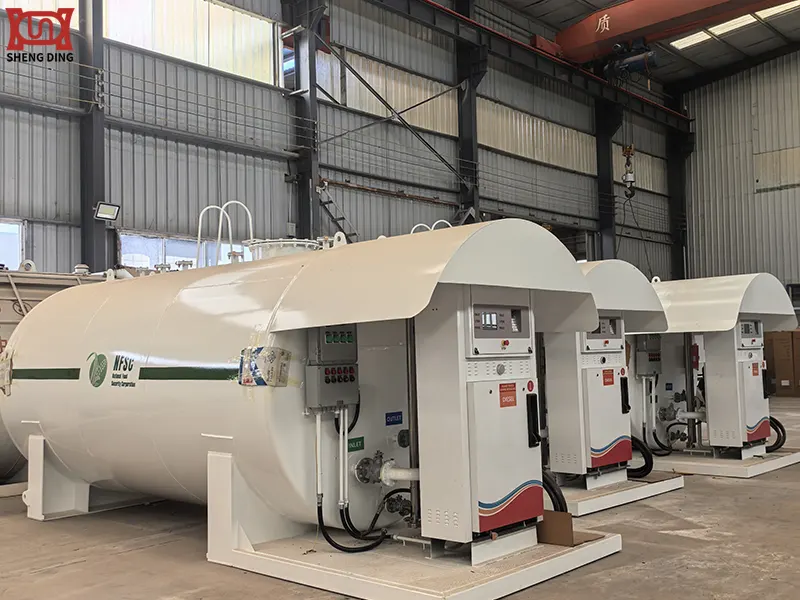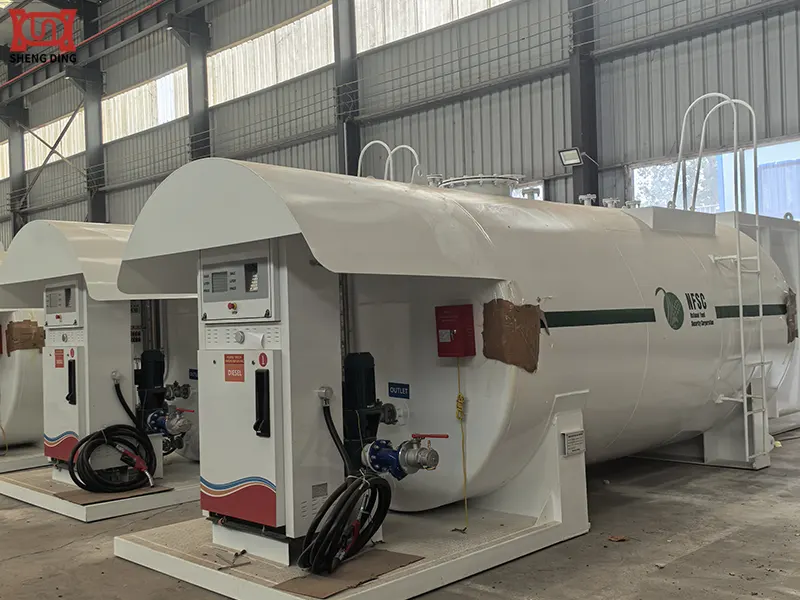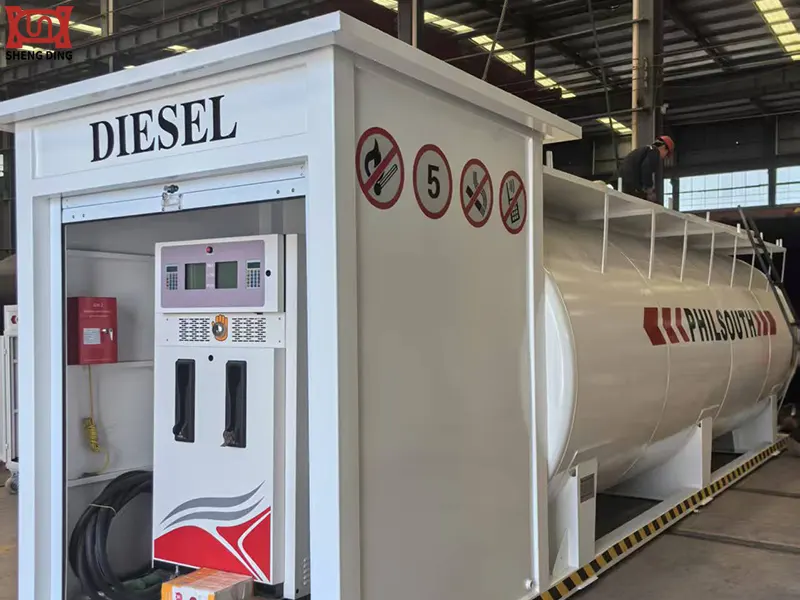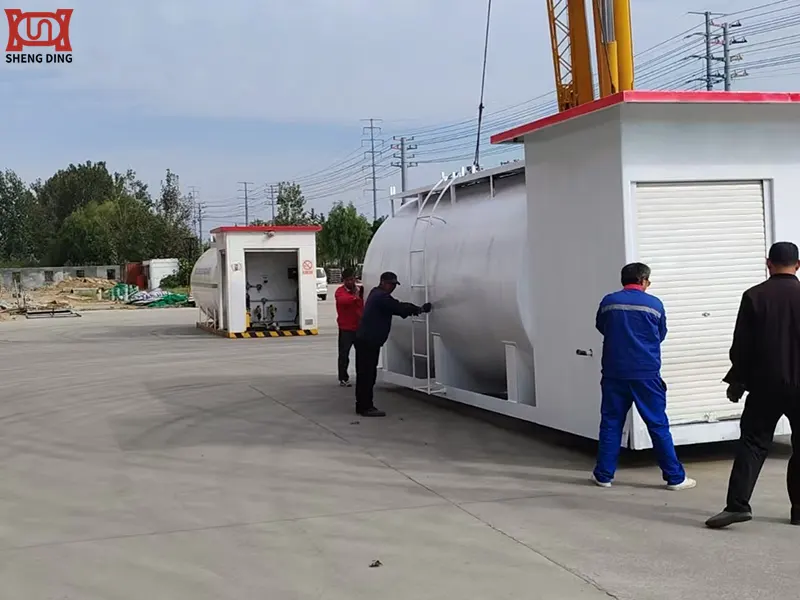The Reason for the Huge Price Difference of Mobile Fuel Stations of the Same Specifications
With the continuous development of society, mobile fuel stations are increasingly favored by manufacturing enterprises. They not only save these enterprises the time and effort of purchasing fuel, but also improve the safety of fuel storage and enhance the convenience of fuel consumption through their mobility. However, with the increase in market demand, the variety of mobile fuel station specifications and models on the market has also increased. What's even more perplexing is that the prices of equipment of the same specifications and models can vary drastically, leaving many consumers confused and even cheated. Today, Shengding Containers will explain the specific reasons for the huge price differences among mobile fuel stations of the same specifications. In fact, the huge price difference among mobile fuel stations of the same specifications is not simply a matter of "expensive" or "cheap," but is determined by a combination of factors including core configuration, compliance, brand service, and additional costs. Let's take a closer look.


1. Vast Differences in Core Equipment and Configuration
The core components of a mobile fuel station are the fuel tank, explosion-proof materials, and fuel dispensers. The brand, material, and technical grade of these components directly determine the cost. In many cases, even slight changes to these components can drastically alter the price difference. Let's take a closer look.
Fuel Tank:
- Material: Ordinary carbon steel vs. high-strength low-alloy steel (with superior corrosion resistance). The process and materials used for the inner wall anti-corrosion coating (such as epoxy resin or fiberglass) also differ significantly in price. Moreover, changing the material has no impact on the model or specifications, and it's not easily distinguishable by appearance.
- Manufacturing Process: Manual welding vs. automated robotic welding. The latter ensures higher uniformity and safety, but is also more expensive.
- Tank Wall Thickness: In many cases, a difference of 1mm in the overall tank wall thickness can result in a significant difference in processing. The standard mobile fuel station tank wall thickness is 6mm; strict requirements must be met when purchasing.
Explosion-Proof Materials:
This is the core of the skid-mounted station's safety and one of the areas with the greatest cost differences.
- Material Types: Various types are available, including aluminum alloy mesh and polymer materials, with significant differences in explosion suppression performance, service life, and price.
- Brand and Certification: Does the manufacturer use materials certified by internationally recognized authorities (such as the Civil Explosives Testing Center)? Smaller manufacturers may use inferior or uncertified materials, posing significant safety hazards.
- Material Usage: Whether the amount of explosion-proof material used meets standards and normal explosion-proof requirements requires safety testing, and these are difficult to discern from appearance alone.
Fuel Dispensers:
- Brand: Internationally renowned brands (such as Wayne, Tokheim) vs. smaller brands. Brand differences result in significant differences in price and stability.
- Function: Ordinary mechanical fuel dispensers vs. fully computerized tax-controlled fuel dispensers; the latter offers more accurate metering, data management, networking, and payment functions.
Valves, Pipelines, and Accessories:
- Using ordinary domestic brands versus imported brands (such as OPW from the US) makes a significant difference in sealing, durability, and safety.
Intelligent Monitoring Systems:
- Function: Many intelligent monitoring systems have the equipment but lack the corresponding functions, such as oil leak detection systems and intelligent unloading systems.
- Sensitivity: While many monitoring systems list this function in their specifications, many do not meet standards, resulting in poor quality and significant price differences.
2. Differences in Compliance and Certification Costs
Mobile refueling stations are special equipment and must comply with stringent international standards. Shengding Containers holds international certifications such as ATEX Certification, Ems Certificate, and Ohsms Certificate of Registration.
- Design Standards: Does it strictly adhere to AQ/T 3002-2021 "Technical Requirements for Explosion-Proof Skid-Mounted Refueling (Gas) Devices" and GB50156 "Technical Standards for Automobile Refueling, Gas Filling, and Hydrogen Refueling Stations"? Compliant designs require more complex calculations and higher-quality materials, naturally increasing costs.
- Third-Party Testing and Certification: Reputable manufacturers provide a "Product Qualification Inspection Report" issued by a nationally accredited third-party testing institution. This testing process is expensive but guarantees safety and compliance. Lower-priced products may not provide valid certification documents.
- Fire Safety and Safety Assessment: Can the manufacturer provide complete technical documentation to assist you in passing fire safety inspections and safety assessments? This "hidden" service is also included in the total price.
3. Manufacturing and Process Level
- Manufacturer Qualification: Is it a large, reputable company with an A2-level pressure vessel manufacturing qualification, or a small assembly plant? The former invests heavily in quality management systems, welding processes, and testing equipment, ensuring product quality.
- Process Details: For example, is the pipeline layout reasonable and aesthetically pleasing? Are the welds smooth? Is the anti-corrosion treatment adequate? Are the labels and markings clear and standardized? These details reflect the manufacturing level and cost investment.
4. Brand, Technology, and Service Added Value
- Brand Premium and Reputation: Well-known brands mean more reliable quality, a more comprehensive service system, and higher market reputation; this value will be reflected in the price.
- Intelligent Systems: Does it integrate level gauges, leakage detection systems, video monitoring systems, remote online management systems, etc.? The higher the level of intelligence, the more convenient the management and operation, but the higher the initial investment.
After-Sales Service:
- Is installation, commissioning, and training provided? Shengding Containers can provide corresponding services such as equipment installation and commissioning, operational training, etc.
- What is the warranty period? (1 year, 2 years, or longer?) Shengding Containers' product warranty period is among the high-end in the industry for products of similar quality.
- What about the response time and repair speed after a malfunction? Shengding Containers' mobile refueling stations provide 724-hour after-sales service.
- A comprehensive after-sales service network requires cost support, and low-priced suppliers often cannot provide timely and effective after-sales service.
5. The Price Trap of "All-Inclusive" vs. "Bare Unit"
The pricing method is also a major cause of confusion. Many manufacturers, in order to attract customers with low prices, often only quote for the bare unit processing, without mentioning any additional costs incurred. These additional costs, such as transportation fees, installation fees, and taxes, are only discussed with the customer after the contract is signed or a deposit is paid. This is actually an dishonest practice.
- "Bare unit" price: This may only include the skid-mounted unit itself, excluding installation, commissioning, civil engineering foundation, handling of procedures, transportation, taxes, etc. These subsequent costs can add up to a considerable amount.
- "All-inclusive" pricing/"turnkey" projects: These include all costs from equipment manufacturing, transportation, on-site foundation construction, installation and commissioning to assisting with related procedures. While this pricing may seem high, it is clear and transparent, and the total cost is controllable.
6. Risk Management
Treat mobile fuel stations as a long-term investment, not a one-time expense. Excessively low prices often conceal the following risks:
- Safety Hazards: Using inferior explosion-proof materials or substandard tanks is like planting a "time bomb."
- Compliance Risks: Failure to pass acceptance tests leads to project abandonment and greater losses.
- High Operating Costs: Frequent equipment failures result in high maintenance costs and low refueling efficiency.
- Short Lifespan: Problems such as corrosion and leaks quickly arise, requiring premature replacement, which actually increases the overall cost.
7. Procurement Recommendations:
- Define Needs: Determine your fuel type, daily refueling volume, and whether you require intelligent management functions.
- In-depth comparison: Don't just look at the total price; request a detailed configuration list and compare the brand, model, and specifications of each core component.
- Verify qualifications: Require the supplier to provide key documents such as a business license, A2 pressure vessel manufacturing license, and third-party testing reports.
- Case study: Visit the supplier's completed projects to understand equipment operation and user feedback.
- Emphasize service: Clearly define the specific content, scope, and response mechanism of after-sales service; ideally, include it in the contract.


8. Related questions
8.1 Can the supporting equipment for a mobile fuel station be purchased separately?
A: Yes, but it's best to purchase them together, as each manufacturer's products have their own matching standards. Purchasing them separately without proper matching can lead to unnecessary losses.
8.2 Is the application process for a mobile fuel station convenient?
A: With continuous technological advancements, mobile fuel stations have gained safety approval from relevant safety departments, making the application process very convenient and quick.
8.3 Can a mobile fuel stations store both diesel and gasoline simultaneously?
A: Yes, you can choose a mobile refueling station that can store both diesel and gasoline, depending on your needs.
8.4 What should I do if problems arise during use?
A: You should contact the manufacturer immediately for consultation. If the problem can be resolved online, do so. If not, request the manufacturer to provide on-site assistance.
9. Conclusion
In summary, in this information age, we must believe in the principle of "you get what you pay for." If two seemingly identical items have a huge price difference, there must be a reason. Remember not to suffer unnecessary losses due to greed for cheap prices, especially for specialized equipment like mobile refueling stations. Inferior products can not only cause financial losses but also pose a safety threat. Shengding Containers has been engaged in the production, research and development, and sales of mobile refueling stations and container refueling stations for many years. Please feel free to contact us if you have any product needs.
Written by
TAIAN SHENGDING METAL CONTAINER MANUFACTURING CO., LTD.
Editor Wang
WhatsApp:+86 152 5486 3111
Email:shengdingtank@126.com
- WhatsApp
- E-MailE-Mail:shengdingtank@126.com
- WeChatWeChat:15254863111









